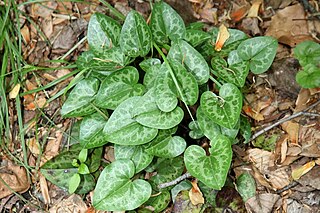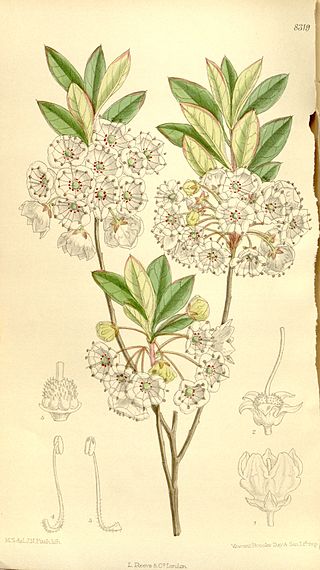
Kalmia latifolia, the mountain laurel, calico-bush, or spoonwood, is a species of flowering plant in the heath family Ericaceae, that is native to the eastern United States. Its range stretches from southern Maine south to northern Florida, and west to Indiana and Louisiana. Mountain laurel is the state flower of Connecticut and Pennsylvania. It is the namesake of Laurel County in Kentucky, the city of Laurel, Mississippi, and the Laurel Highlands in southwestern Pennsylvania.

Kalmia is a genus of about ten species of evergreen shrubs from 0.2–5 m tall, in the family Ericaceae. They are native to North America and Cuba. They grow in acidic soils, with different species in wet acid bog habitats and dry, sandy soils.
Mountain Laurel or mountain laurel may refer to:
Calico is a plain-woven cotton textile.

USS Isherwood (DD-284) was a Clemson-class destroyer in service with the United States Navy from 1919 to 1930. She was scrapped in 1931.

Kalmia polifolia, previously known as Kalmia glauca and commonly called bog laurel, swamp laurel, or pale laurel, is a perennial evergreen shrub of cold acidic bogs, in the family Ericaceae. It is native to north-eastern North America, from Newfoundland to Hudson Bay southwards.

Kalmia Gardens is a mature botanical garden located at 1624 West Carolina Avenue, Hartsville, South Carolina. Part of Coker University, it is open daily without admission.

Kalmia angustifolia is a flowering shrub in the family Ericaceae, commonly known as sheep laurel. It is distributed in eastern North America from Ontario and Quebec south to Virginia. It grows commonly in dry habitats in the boreal forest, and may become dominant over large areas after fire or logging. Like many plant species of infertile habitats it has evergreen leaves and mycorrhizal associations with fungi. It is also found in drier areas of peat bogs.
The Lebanon and Tremont Branch of the Philadelphia & Reading Railroad was a railroad line in Lebanon and Schuylkill County, Pennsylvania, built to tap the coal fields in the West End of Schuylkill County and send coal southward to Lebanon.
Langley is a census-designated place (CDP) in Aiken County, South Carolina, United States. The population was 1,447 at the 2010 census. It is bordered by Gloverville to the northeast and Burnettown to the west.
USS Kalmia may refer to the following ships of the United States Navy:
An oak–heath forest is a plant community association and type of forest ecology. It is a deciduous forest type of well-drained, acidic soils, characterized by oaks (Quercus) and plants of the heath family (Ericaceae). It is commonly found in the high elevations of the eastern United States. Such forest areas typically have a dense fibrous root layer at the surface of the soil, and in many areas predominate on south-facing or southwest-facing slopes. Many of the existing oak–heath forests once featured American chestnut as an important canopy species.

Sphinx kalmiae, the laurel sphinx, is a moth of the family Sphingidae.

The Thomas E. Hart House and Kalmia Gardens is a 30-acre (12 ha) property in Hartsville, South Carolina, that was listed on the U.S. National Register of Historic Places in 1991. The house was built in 1817.

Poinsett State Park is located in Sumter County in the U.S. state of South Carolina. The park is best known for its botanical oddities, combining the flora of the Blue Ridge Mountains foothills and Piedmont of Upstate South Carolina, the xeric Sandhills and the Atlantic coastal plain. In Poinsett State Park one can see mountain laurels draped with Spanish moss. The park, which has been called "weird and beautiful", is named after amateur botanist and South Carolina native Joel Roberts Poinsett, the first American ambassador to Mexico and popularizer of the poinsettia. There is a $3 charge for admission to Poinsett State Park and there are small fees for overnight camping and cabin rentals. The park is surrounded by the Manchester State Forest, and both provide access to the Palmetto Trail, linked hiking and mountain bike trails, and Manchester State Forest offers equestrian trails.

Hexastylis naniflora is a rare species of flowering plant in the birthwort family known by the common name dwarf-flowered heartleaf. It is endemic to the Piedmont region of the United States, where it is limited to a small area straddling the border between North Carolina and South Carolina. It is a federally listed threatened species.

Kalmia procumbens, commonly known as alpine azalea or trailing azalea, is a dwarf shrub of high mountain regions of the Northern Hemisphere that usually grows no more than 10 centimeters (4 in) tall. Originally named by Linnaeus as Azalea procumbens, it is also named after French botanist L.L.A. Loiseleur-Deslongchamps - Loiseleuria procumbens.

Kalmia cuneata is a species of flowering plant in the heath family known by the common name whitewicky, sometimes spelled white-wicky or white wicky. It is native to the eastern United States, where it occurs only in North Carolina and South Carolina.

Kalmia buxifolia is a species of flowering plant in the family Ericaceae known by the common name sandmyrtle, or sand-myrtle. It is native to the mid-Atlantic and southeastern United States, where it has a disjunct distribution, occurring in three separate areas. It is known from the Pine Barrens of New Jersey, the Coastal Plain of the Carolinas, and the southeastern Blue Ridge Mountains.












